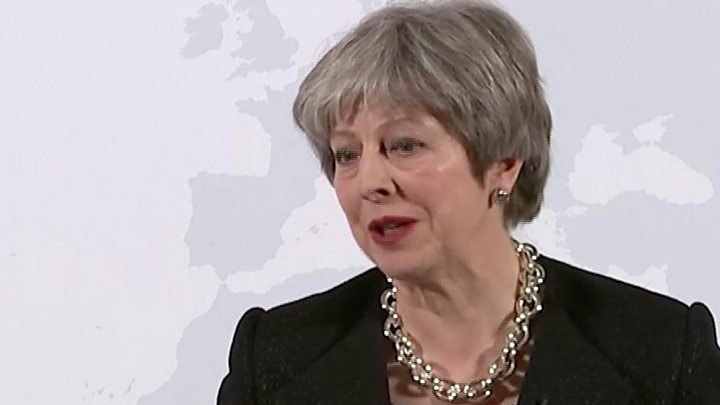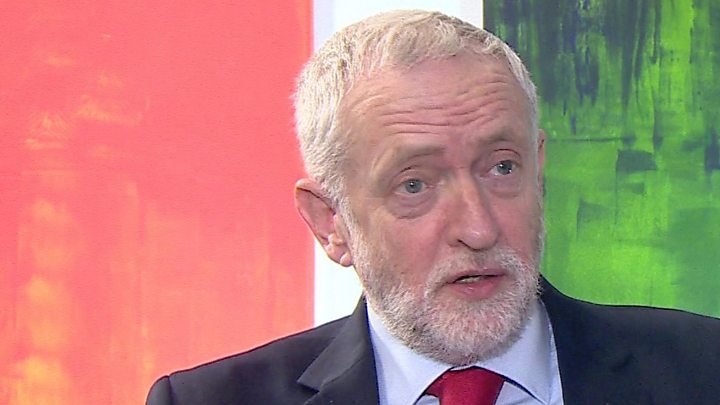
Media playback is unsupported on your device
Theresa May has warned that "no-one will get everything they want" out of Brexit negotiations but she is confident a deal can be done.
Setting out UK hopes for a future EU economic partnership, Mrs May warned both sides had to accept "hard facts".
Single market access would be "less than it is now" and the UK would have to pay into some EU agencies.
But she would not threaten to walk out of talks and in a message to the EU said: "Let's get on with it."
The UK is due to leave the EU on 29 March 2019 but it wants a transition period lasting around two years after to smooth the way for business.
Mrs May said she was confident remaining differences over a draft EU legal agreement could be resolved, allowing trade talks to get under way.
She said life would be different for the UK outside the EU's single market: "In certain ways, our access to each other's markets will be less than it is now."
The UK could not expect to "enjoy all the benefits without all of the obligations" of membership.
Another "hard fact" would be that the UK would still continue to be affected by EU law and some decisions of the European Court of Justice - as the ECJ rules on whether EU agreements are legal - but she stressed that the "jurisdiction of the European Court of Justice in the UK must end".
The UK may choose to remain "in step" with EU regulations in areas like state aid and competition, in order to get "good access" to markets, she said.
The hard fact for the EU was that the UK would want its own bespoke trade deal, not an "off-the-shelf model".
Key trade proposals
The speech contained a lot of detail on the kind of trading relationship Mrs May wants with the EU after Brexit.
- Banks located in the City of London will lose the right to trade across EU without country-by-country approval, so-called passporting. A new system will be brought in to allow "the same regulatory outcomes over time"
- Associate membership of EU medicines, chemical and aviation agencies, accepting their rules and making "appropriate" financial contributions
- Parliament would reserve the right to pass its own regulations in these areas but in the knowledge it could threaten co-operation with those bodies
- Continued participation in EU science, education and cultural programmes, close relationship with Euratom
- UK to explore continued participation in EU's internal energy market while protecting single energy market on the island of Ireland
- Independent arbitration mechanism for trade disputes to replace role currently played the European Court of Justice
- Fairer deal for UK fishermen based on reciprocal access to waters and shared stocks management
- Mutual recognition of broadcasting rules to allow UK channels to continue to be seen in Europe
- Ensure continuity of rail, maritime and aviation services and of hauliers' access to European markets
- Keeping UK regulatory standards "as high as the EU's" to ensure smooth trade and while UK law may not be "identical" to EU law "it should achieve the same outcomes"
Labour reaction

Media playback is unsupported on your device
Jeremy Corbyn said the PM's speech added up to "yet more confusion on the road to complications".
He told the BBC that "despite saying that the Northern Ireland border issue had been settled in phase one, she now re-opens the whole thing with essentially a two tier border".
He insisted Labour's position on Brexit was different because Mrs May wanted "parts of competition rules and single market rules that prevent state aid".
By contrast, he said, Labour would want "the power to intervene to protect industries and jobs and to end the internal market in both local government and the National Health Service".
Analysis
By BBC Political Correspondent Alex Forsyth
Mrs May was sending a message to those - not least her own backbenchers - who've been piling on pressure in pursuit of their version of Brexit.
She talked of pragmatism and common sense; no doubt a message for those on both sides of the Channel.
There was sweeping vision; regaining control and respecting the referendum result; but she also signalled willingness to compromise which won't play well with some.
The real test will be whether this speech was enough to convince critics that Mrs May's ambition for Brexit is credible and achievable without alienating her own MPs.
May's five tests for a deal
The prime minister began her speech by setting out five "tests" for the negotiations and pledged to "bring our country together".
- That any deal must respect the referendum result
- That any deal must not break down
- That any deal must protect jobs and security
- That any deal must be "consistent with the kind of country we want to be" - modern, outward-looking and tolerant
- That any agreement must bring the country together
Neither Norway nor Canada
The prime minister called for a free trade agreement covering most sectors of the economy, going further than the deal signed between Canada and the EU but stopping short of Norway which is a member of the European Economic Area.
"We need to strike a new balance. but we will not accept the rights of Canada and the obligations of Norway," she said.
The Irish border
She again said a hard Irish border or a border between Northern Ireland and the rest of the UK would be "unacceptable" and said it was for the UK and EU to "work together" on a solution.
She suggested this could be either a customs partnership, where the UK "mirrors" EU requirements on goods from around the world, or a streamlined customs arrangement, using technology and "trusted trader" schemes to do away with the need for customs checks.
Cherry-picking
Amid criticism from the EU that the UK was attempting to "cherry-pick" the best parts of the bloc's rules, she said: "The fact is that every free trade agreement has varying market access depending on the respective interests of the countries involved.
"If this is cherry-picking, then every trade arrangement is cherry-picking."
Reaction from Brussels
The EU's chief Brexit negotiator Michel Barnier welcomed the speech, saying it provided "clarity" about the UK leaving the single market and customs union and a "recognition" that trade-offs will inform future talks on a deal.
But the European Parliament's Brexit co-ordinator Guy Verhofstadt was not impressed.
He said: "Theresa May needed to move beyond vague aspirations, we can only hope that serious proposals have been put in the post.
While I welcome the call for a deep and special partnership, this cannot be achieved by putting a few extra cherries on the Brexit cake. "
Conservative reaction
The speech got a positive reaction from Brexit-backing cabinet ministers, with Foreign Secretary Boris Johnson tweeting: "We will remain extremely close to our EU friends and partners - but able to innovate, to set our own agenda, to make our own laws and to do ambitious free trade deals around the world."
But pro-European Tory rebel Anna Soubry told the BBC Leave voters would be right to question what was in it for them.
"The Brexit we are heading towards is very, very different to the one we were promised," she said.
Other reaction
The DUP, who Mrs May relies on for key Commons votes, welcomed Mrs May's "clear commitment that she will not countenance any new border being created in the Irish Sea between Northern Ireland and the rest of the United Kingdom".
Leader Arlene Foster said she had "set forward the basis upon which it would be possible to move forward."
Business group the CBI tweeted: "Excellent news if UK can stay in key agencies like EASA (European Aviation Safety Agency) - glad PM has focused on them."
The TUC said there was "still a chasm between the prime minister's rhetoric and reality".
Read Again http://www.bbc.com/news/uk-politics-43250035Bagikan Berita Ini















0 Response to "'Hard facts' for both sides in Brexit talks - Theresa May"
Post a Comment